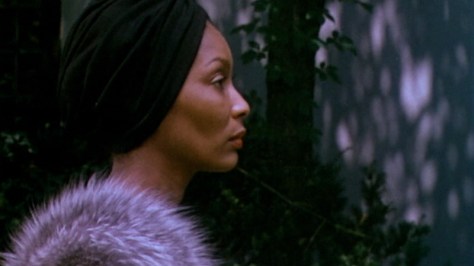
Format: Dual Format (DVD + Blu-ray)
Release date: 26 January 2015
Distributor: Eureka Entertainment
Director: Bill Gunn
Writer: Bill Gunn
Cast: Duane Jones, Marlene Clark, Bill Gunn
USA 1973
123 mins
Ganja & Hess was conceived as a black vampire movie: producers Jack Jordan and Quentin Kelly wanted to capitalise on the recent success of Blacula (1972) and other ‘blaxploitation’ films Hollywood had started making to appeal to African-American audiences. Playwright and novelist Bill Gunn readily accepted the producers’ offer of $350,000 to make his first feature film, but was determined to create something far more ambitious than a genre film. He decided to use vampirism as a metaphor to explore the idea of addiction in all its forms.
Ganja & Hess is utterly original, but if I had to compare it to another film, it would be Jacques Rivette’s Celine and Julie Go Boating, which was released the following year: both films are set in a large house where statuesque actors and actresses engage in dreamlike scenarios where time telescopes. More broadly, in its uncompromising creativity Ganja & Hess reminds me of the supremely unusual films, past and present, screened in Paris’s Latin Quarter: films that are experienced first and understood only later (if ever). Films where the only thing certain is that you’ve never seen anything quite like them. Films so fresh and innovative that you feel anything could happen. Films that restore your youthful impression of time and space opening up before you with unexpected possibility.
Ganja & Hess is worlds away from the cool swagger and forthright action of a film like Shaft. Professor Hess Green is an academic who surrounds himself with books and art, rides in an elegant chauffeured car and speaks in French with his son. As the film’s producer and editor point out in the DVD’s extensive extra material, this was revolutionary, as audiences had never before seen a film centred on a cultivated African-American character. Actor Duane Jones was particularly well suited to the role: although he is best known as the star of Night of the Living Dead (1968), he also worked as a college professor. The director himself appears as George Meda, the assistant who infects the professor with vampirism. Marlene Clark plays Meda’s wife, Ganja, who comes looking for her missing husband and quickly develops a relationship with the professor.
Ganja & Hess appropriates the vampire myth into a specifically African-American context through richly layered cultural references that include ancient legend, art, song, and costume. The film is bookended by documentary-style footage of an African-American evangelical church, seen as a place of passion and togetherness as well as a source of comfort and salvation.
The film was released in its original version for barely a week. It was this version that won Best Film at Critics’ Week in Cannes but was reviled by critics at home. The producers accordingly hired a different editor to recut it as a sexploitation film, which screened at drive-ins under various titles including Blood Couple, Double Possession and Black Evil. The director, one of the producers and the original editor were so disgusted that they had their names removed from the film. This new home entertainment release finally gives audiences another chance to see this ambitious and innovative film as its creators originally intended.
Alison Frank
